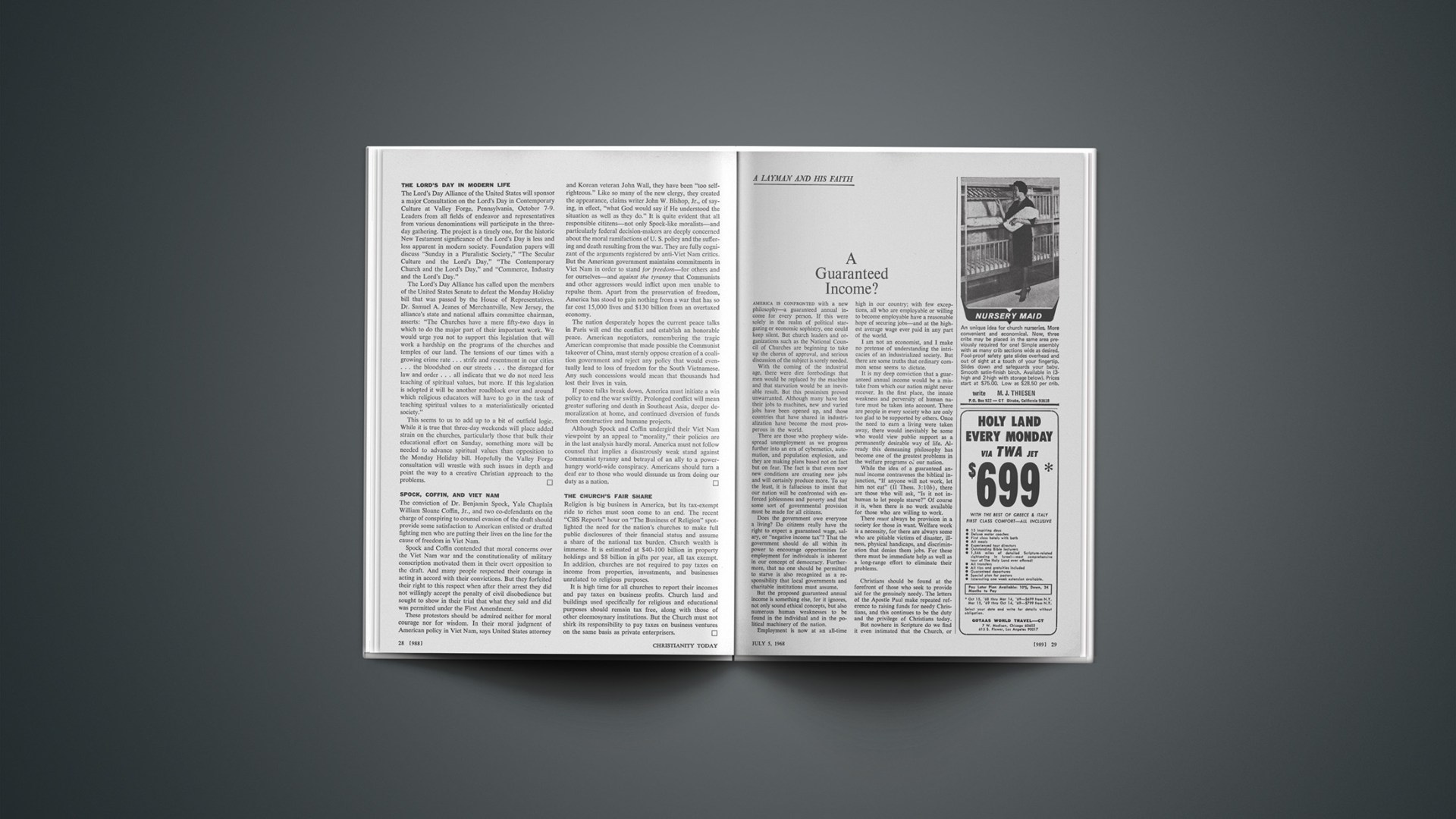America is confronted with a new philosophy—a guaranteed annual income for every person. If this were solely in the realm of political stargazing or economic sophistry, one could keep silent. But church leaders and organizations such as the National Council of Churches are beginning to take up the chorus of approval, and serious discussion of the subject is sorely needed.
With the coming of the industrial age, there were dire forebodings that men would be replaced by the machine and that starvation would be an inevitable result. But this pessimism proved unwarranted. Although many have lost their jobs to machines, new and varied jobs have been opened up, and those countries that have shared in industrialization have become the most prosperous in the world.
There are those who prophesy widespread unemployment as we progress further into an era of cybernetics, automation, and population explosion, and they are making plans based not on fact but on fear. The fact is that even now new conditions are creating new jobs and will certainly produce more. To say the least, it is fallacious to insist that our nation will be confronted with enforced joblessness and poverty and that some sort of governmental provision must be made for all citizens.
Does the government owe everyone a living? Do citizens really have the right to expect a guaranteed wage, salary, or “negative income tax”? That the government should do all within its power to encourage opportunities for employment for individuals is inherent in our concept of democracy. Furthermore, that no one should be permitted to starve is also recognized as a responsibility that local governments and charitable institutions must assume.
But the proposed guaranteed annual income is something else, for it ignores, not only sound ethical concepts, but also numerous human weaknesses to be found in the individual and in the political machinery of the nation.
Employment is now at an all-time high in our country; with few exceptions, all who are employable or willing to become employable have a reasonable hope of securing jobs—and at the highest average wage ever paid in any part of the world.
I am not an economist, and I make no pretense of understanding the intricacies of an industrialized society. But there are some truths that ordinary common sense seems to dictate.
It is my deep conviction that a guaranteed annual income would be a mistake from which our nation might never recover. In the first place, the innate weakness and perversity of human nature must be taken into account. There are people in every society who are only too glad to be supported by others. Once the need to earn a living were taken away, there would inevitably be some who would view public support as a permanently desirable way of life. Already this demeaning philosophy has become one of the greatest problems in the welfare programs of our nation.
While the idea of a guaranteed annual income contravenes the biblical injunction, “If anyone will not work, let him not eat” (2 Thess. 3:10b), there are those who will ask, “Is it not inhuman to let people starve?” Of course it is, when there is no work available for those who are willing to work.
There must always be provision in a society for those in want. Welfare work is a necessity, for there are always some who are pitiable victims of disaster, illness, physical handicaps, and discrimination that denies them jobs. For these there must be immediate help as well as a long-range effort to eliminate their problems.
Christians should be found at the forefront of those who seek to provide aid for the genuinely needy. The letters of the Apostle Paul make repeated reference to raising funds for needy Christians, and this continues to be the duty and the privilege of Christians today.
But nowhere in Scripture do we find it even intimated that the Church, or individual Christians, should become involved in a program to guarantee an income to all people. This, while seemingly a humanitarian concept, is basically a political one with great potential for being detrimental to our society. It would almost inevitably become a political football. We would find one party vying with another to offer more and more to an ever-growing dependent segment of our society.
In other words, instead of being viewed as a fluid situation—one to be met by shifting methods as conditions varied—poverty would eventually be seen as a permanent political problem, and an evergrowing number of people would view state support as an approved way of life.
No one questions the existence of poverty in our land of affluence. Nor does anyone question the need for some plan of relief. But any such program should be in the nature of an emergency measure, not a permanent grant regarded as the natural “right” of the recipient. It is the aspect of permanence involved in the demand for a guaranteed annual income that makes it particularly dangerous, while the certainty of escalation because of political pressures would cause it to become an intolerable fiscal burden on those who work and pay taxes. The Church and individual Christians should face up to the inherent dangers in this proposal. The meeting of human need should not be left to the politician; relief should come through Christian and social-service efforts. Relief of the poverty-stricken should never become a professional matter, divorced from realistic administration and Christian compassion.
As we read about the early Church, we find that Christians were deeply concerned about the plight of needy brethren. Today, even within the Church, the trend is to urge the government to provide for all the poor, while the Church apparently makes no distinction, so far as its own responsibility is concerned, between needy people inside and outside the Church. Perhaps this naturally is a part of the thinking of those for whom the distinction between believers and unbelievers no longer exists.
It has been advocated that ministers take up the question whether all should be paid the same salaries. Establishment of an organization devoted exclusively to the care of needy Christians might also receive consideration. At the moment, both possibilities might have more claim on the Church’s attention than her present concern to lobby the government into providing a guaranteed annual income for all citizens.
Going into this could prove to be the most foolish move our government has ever been pressured into making.










